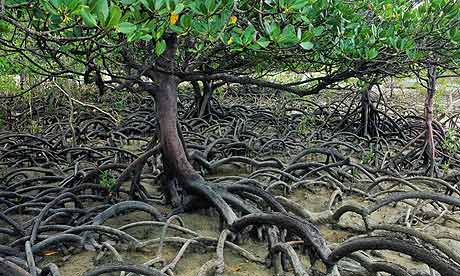
The decine of vast areas of mangroves is an environmental problem that must be urgently addressed, experts say. Photograph: Theo Allofs/Corbis
The steeply accelerating decline of the natural world is already costing hundreds of billions of pounds a year, say leading economists, in a review of the costs and benefits of forests, rivers and marine life. The losses will increase dramatically over the next generation unless urgent remedial action is taken, they say.
An interim report presented to world leaders meeting in Bonn yesterday warns of the "severe consequences" to all economies if forests continue to be felled, seas overfished and if land is turned to intensive farming. The report says that the world has lost 40% of its forests in 300 years, and half its wetlands in just 50 years. More than one third of mangroves have disappeared in just 20 years and there is increasing soil loss, as well as severe erosion, and growing water scarcity. Details on how to estimate the costs associated with this environmental degradation will come in the final report, due by 2010.
The new Economics of Ecosystems and Biodiversity review argues that biodiversity loss is already leading to wars and political destabilisation and international tension. Furthermore, the livelihoods of billions of the world's poorest people who depend directly on nature to earn their living are being undermined.
"We are consuming the world's biodiverse ecosystem at an unsustainable rate and this is starting to have serious socio-economic impacts", say the authors, led by Deutsche Bank economist Pavan Sukhdev. "We must ultimately answer to nature for the simple reason that it has limits and rules of its own. There are no economies without environments but there are environments without economies."
The review is modelled on the UK government's Stern review of climate change which in 2006 warned that the global economy would effectively collapse if countries did not address greenhouse gases, and that countries could not afford not to act.
"With biodiversity loss we are not only considering long term horizons as we are with climate change," the authors write. "Ecosystem degradation is already extensive and observable and its effects are dramatic. Significant losses are happening right now."
The economists warn that on current trends, 11% of the world's untouched forests and 60% of its coral reefs could be lost by 2030. About 60% of the Earth's ecosystem, examined by the researchers, has been degraded in the past 50 years. Population growth, changing land use and global climate change will lead to further declines.
The review references previous economic studies suggesting biodiversity loss could cost the world 7% of its economic wealth by 2050, a figure that would be measured in trillions of dollars a year. "This is a conservative estimate because it is partial, and does not account for loss of marine services", say the authors.
They call on governments to rethink subsidies to reflect tomorrow's priorities, and to urgently find a better way to value ecosystem damage. "The fundamental requirement is to develop an economic yardstick that is more effective than GDP for assessing the performance of an economy. Countries, companies and individuals need to understand the real costs of using the Earth's natural capital", they say.

No comments:
Post a Comment